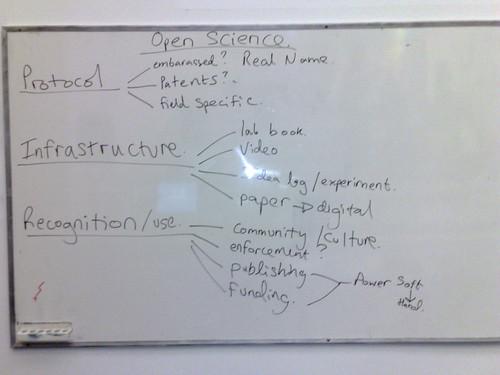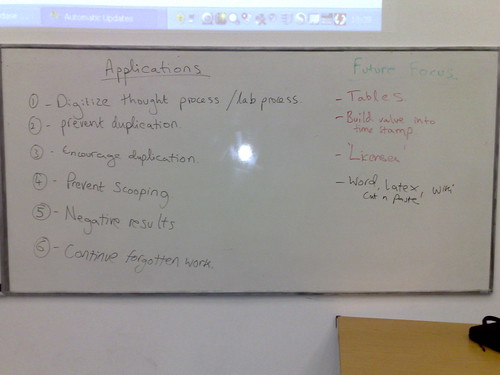 Image via Wikipedia
Image via Wikipedia
This has taken me longer than expected to write up. Julius Lucks, John Cumbers, and myself lead a workshop on Open Science on Monday 21st at the BioSysBio meeting at Imperial College London. I had hoped to record screencast, audio, and possibly video as well but in the end the laptop I am working off couldn’t cope with both running the projector and Camtasia at the same time with reasonable response rates (its a long story but in theory I get my ‘proper’ laptop back tomorrow so hopefully better luck next time). We had somewhere between 25 and 35 people throughout most of the workshop and the feedback was all pretty positive. What I found particularly exciting was that, although the usual issues of scooping, attribution, and the general dishonestly of the scientific community were raised, they were only in passing, with a lot more of the discussion focussing on practical issues.
I spoke on Open Science in general, and gave examples of groups blogging in a general way about their research, open notebooks, open grant proposal writing and some of my thoughts about how we should take scientific information management forward. Julius Lucks presented an introduction to OpenWetWare with a particular focus on some of his recent experiences on using online systems to complement and expand the remit of the traditional journal article.
John Cumbers then spoke at the end trying to define the important issues and identify the priorities to be tackled in the future. The pictures are of the notes he wrote on the whiteboard. In retrospect we should have moved faster into this part of the workshop. While the earlier conversation was good and productive, it was less focussed, and if we had pushed on quicker (and if I’d spoken less!) we might have pinned some of the issues down more.

Having said that, I think we got a pretty clear and strong steer on what the issues are and what people felt was important. The pictures were taken of the whiteboard after the workshop. The concept of a charter or protocol and standards for Open Science got very strong support. While there wasn’t any agreement on exactly what form that would take there was a very strong sense that by providing clear guidelines, both on what qualifies as ‘Open Science’ and on code(s) of conduct to be followed, would provide a clarity that doesn’t currently exist; a framework that people can sign up to and reasonably expect that other people will recognise and follow. In a sense it doesn’t matter that much what such codes actually are. Simply having such things will make a big difference.

Associated with the ideas of a code of conduct is the need for legally enforceable licenses for data. There was a strong sense that if it were possible to enforce attribution, and possibly protect some rights to a slice of any future return on exploitation that there would be much wider adoption of Open Practice. The work of Science Commons, Open Knowledge Foundation and others in this space is clearly very important. The idea of Open Science within a closed community as a way of achieving was raised. While I can see the appeal for solving these practical issues of enforceable licences, to me, it defeats the purpose of the exercise. But I think this idea is likely to keep coming back around, so it deserves consideration and discussion.
We will take the discussion forward on charters, licences, recognition, and all the issues raised looking forward to the workshop at the Pacific Symposium on Biocomputing in January next year. I would suggest a way forward is for people to blog their ideas and suggestions and that we aim to try and capture and integrate those ideas over the next few months. I would suggest using the tag ‘open-science-charter’ for aggregation. Anyone who doesn’t have or doesn’t want to bother with their own blog is more than welcome to send me their ideas and I can publish them here.
Overall the workshop was a very positive experience. If there was one take home message for me it was that, for this group at least, the discussion has moved on from ‘I’m too scared to do this’ to ‘I don’t think I can do this for these specific set of reasons; get them sorted and then we will see where we go from there.


TBH, a closed network might work quite well in promotion of the ethos – at least initially. If you recall, this is essentially the way that gmail was established.
The general idea is you and all your trustworthy mates form a network – this initially excludes everyone (hopefully) who has been a in the past – and gives the people who have behaved ethically a head start (the rewards of openscience that will come to all). I would assume these people would recruit as many trustworthy people as they could, and soon all the community is more or less involved. Those who had previously survived by knowingly prepublishing or other unethical practices might see that they have lost an advantage and reform, thus being invited by colleagues. So a peer-pressure mechanism at work to enforce ethics, as there will be an advantage to being part of the group. And there isn’t any reason to stop interested parties who are not practicing scientists joining.
And then no reason not to open out once there is an established network of trust and enough people to keep it going.
TBH, a closed network might work quite well in promotion of the ethos – at least initially. If you recall, this is essentially the way that gmail was established.
The general idea is you and all your trustworthy mates form a network – this initially excludes everyone (hopefully) who has been a in the past – and gives the people who have behaved ethically a head start (the rewards of openscience that will come to all). I would assume these people would recruit as many trustworthy people as they could, and soon all the community is more or less involved. Those who had previously survived by knowingly prepublishing or other unethical practices might see that they have lost an advantage and reform, thus being invited by colleagues. So a peer-pressure mechanism at work to enforce ethics, as there will be an advantage to being part of the group. And there isn’t any reason to stop interested parties who are not practicing scientists joining.
And then no reason not to open out once there is an established network of trust and enough people to keep it going.